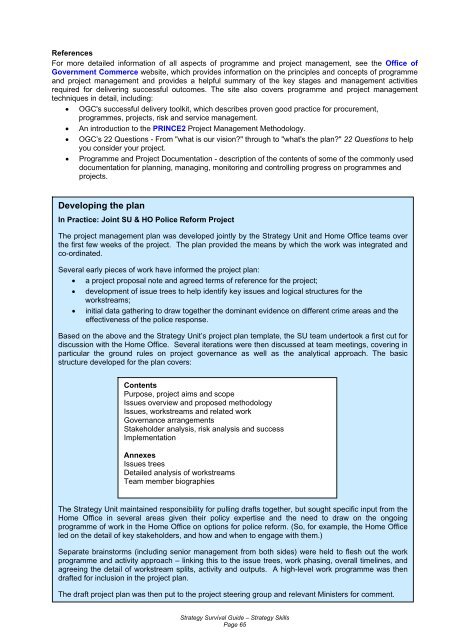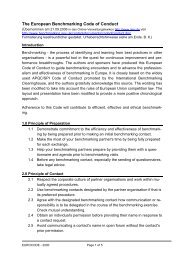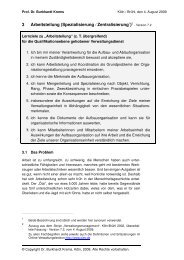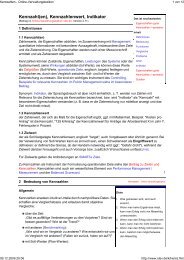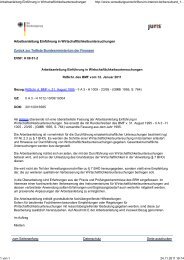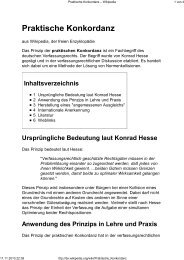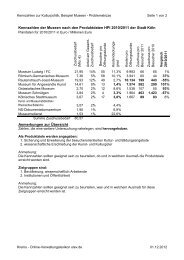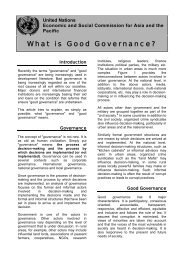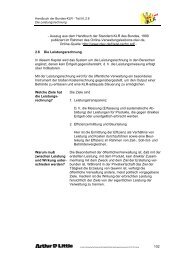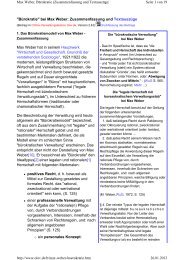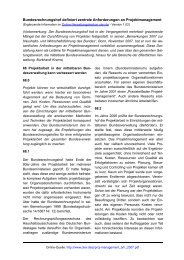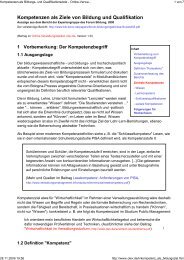Strategy Survival Guide
Strategy Survival Guide
Strategy Survival Guide
Create successful ePaper yourself
Turn your PDF publications into a flip-book with our unique Google optimized e-Paper software.
References<br />
For more detailed information of all aspects of programme and project management, see the Office of<br />
Government Commerce website, which provides information on the principles and concepts of programme<br />
and project management and provides a helpful summary of the key stages and management activities<br />
required for delivering successful outcomes. The site also covers programme and project management<br />
techniques in detail, including:<br />
• OGC's successful delivery toolkit, which describes proven good practice for procurement,<br />
programmes, projects, risk and service management.<br />
• An introduction to the PRINCE2 Project Management Methodology.<br />
• OGC’s 22 Questions - From "what is our vision?" through to "what's the plan?" 22 Questions to help<br />
you consider your project.<br />
• Programme and Project Documentation - description of the contents of some of the commonly used<br />
documentation for planning, managing, monitoring and controlling progress on programmes and<br />
projects.<br />
Developing the plan<br />
In Practice: Joint SU & HO Police Reform Project<br />
The project management plan was developed jointly by the <strong>Strategy</strong> Unit and Home Office teams over<br />
the first few weeks of the project. The plan provided the means by which the work was integrated and<br />
co-ordinated.<br />
Several early pieces of work have informed the project plan:<br />
• a project proposal note and agreed terms of reference for the project;<br />
• development of issue trees to help identify key issues and logical structures for the<br />
workstreams;<br />
• initial data gathering to draw together the dominant evidence on different crime areas and the<br />
effectiveness of the police response.<br />
Based on the above and the <strong>Strategy</strong> Unit’s project plan template, the SU team undertook a first cut for<br />
discussion with the Home Office. Several iterations were then discussed at team meetings, covering in<br />
particular the ground rules on project governance as well as the analytical approach. The basic<br />
structure developed for the plan covers:<br />
Contents<br />
Purpose, project aims and scope<br />
Issues overview and proposed methodology<br />
Issues, workstreams and related work<br />
Governance arrangements<br />
Stakeholder analysis, risk analysis and success<br />
Implementation<br />
Annexes<br />
Issues trees<br />
Detailed analysis of workstreams<br />
Team member biographies<br />
The <strong>Strategy</strong> Unit maintained responsibility for pulling drafts together, but sought specific input from the<br />
Home Office in several areas given their policy expertise and the need to draw on the ongoing<br />
programme of work in the Home Office on options for police reform. (So, for example, the Home Office<br />
led on the detail of key stakeholders, and how and when to engage with them.)<br />
Separate brainstorms (including senior management from both sides) were held to flesh out the work<br />
programme and activity approach – linking this to the issue trees, work phasing, overall timelines, and<br />
agreeing the detail of workstream splits, activity and outputs. A high-level work programme was then<br />
drafted for inclusion in the project plan.<br />
The draft project plan was then put to the project steering group and relevant Ministers for comment.<br />
<strong>Strategy</strong> <strong>Survival</strong> <strong>Guide</strong> – <strong>Strategy</strong> Skills<br />
Page 65


